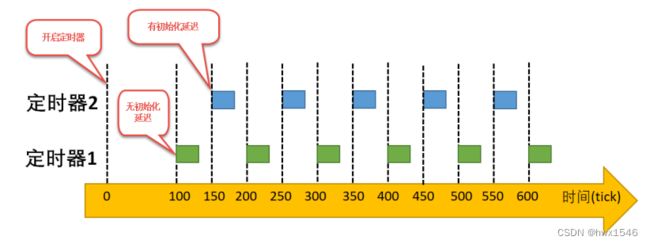STM32F4X UCOSIII软件定时器
STM32F4X UCOSIII软件定时器
定时器概念
定时器在MCU中是一个很常用的外设,其作用是可以在某个事件点触发MCU中断,告知MCU处理事情。定时器跟生活中的闹钟很类似,可以设置闹钟每天什么时候响,还能设置响的次数,是响一次还是每天都响。定时器也有硬件定时器和软件定时器之分。
硬件定时器
硬件定时器通常是MCU的内部资源,当用户需要使用硬件定时器时,需要配置硬件定时器的分频系数,重装载数,使其满足用户的需要。硬件定时器的精度一般都很高,可以达到纳秒级别,而且硬件定时器通常跟中断一起配合使用。缺点就是硬件定时器资源有限,配置也比较复杂。
软件定时器
软件定时器是由操作系统提供的一类系统接口,软件定时器是基于硬件定时器之上,使系统可以不受硬件定时器的资源限制,理论上只要系统的存储空间充足,用户就可以创建很多的软件定时器。软件定时器通常会绑定一个回调函数,当定时时间到的时候,就调用回调函数,相当于硬件定时器的中断。
UCOSIII软件定时器
UCOSIII支持软件定时器,在MCU资源允许的情况下,用户可以创建多个软件定时器,UCOSIII的软件定时器有以下特点。
UCOSIII软件定时器运行模式
UCOSIII软件定时器的运行模式有两种,分别是单次模式和周期模式,两种模式的区别如下
- 单次模式:软件定时器的定时时间到了之后,只会执行一次回调函数,然后就不会继续执行,用户可以再次调用OSTmrStart函数继续执行
- 周期模式:软件定时器开始工作后,会按照设定的定时时间循环运行。

上图设置两个定时器,其中定时器1定时时间是200个tick,周期运行。定时器2定时时间是100个tick,单次运行。定时器开始运行后,当定时2达到定时时间时,会调用一次回调函数然后就停止,定时器1则会循环执行。
UCOSIII软件定时器周期模式
UCOSIII中软件定时器的周期模式也有两种,一种是初始化延时,一种是无初始化延时
- 初始化延时:在软件定时器创建的时候,其第一个定时周期是由定时器中的 dly 参数决定,然后在运行完第一个周期后,其以后的定时周期均由period 参数决定。
- 无初始化延时:定时器一直按周期运行

上图设置两个定时器,其中定时器1定时时间是100个tick,周期运行。定时器2定时的初始化周期是150tick,周期是100tick。定时器开始运行后,当定时2达到初始化周期时会调用一次回调函数,之后定时器2就会按照100tick的定时周期循环运行。而定时器1则会按照100tick定时周期循环执行。
UCOSIII软件定时器API
软件定时器创建函数
/*
* p_tmr:定时器对象
* p_name:定时器名字
* dly:定时器初始值
* period:定时器周期
* opt:用户选项
* p_callback:回调函数
* p_callback_arg:回调函数参数
* p_err:错误代码
*/
void OSTmrCreate (OS_TMR *p_tmr,
CPU_CHAR *p_name,
OS_TICK dly,
OS_TICK period,
OS_OPT opt,
OS_TMR_CALLBACK_PTR p_callback,
void *p_callback_arg,
OS_ERR *p_err)
其中opt可以选择OS_OPT_TMR_ONE_SHOT和OS_OPT_TMR_PERIODIC
- OS_OPT_TMR_ONE_SHOT:单次模式
- OS_OPT_TMR_PERIODIC:周期模式
软件定时器启动函数
/*
* p_tmr:定时器对象
* p_err:错误代码
返回值 : DEF_TRUE:定时器开始运行
DEF_FALSE:没有定时器
*/
CPU_BOOLEAN OSTmrStart (OS_TMR *p_tmr,
OS_ERR *p_err)
定时器停止函数
/*
* p_tmr:定时器对象
* opt:用户选项
* p_callback_arg:用户新设置的回电函数参数
* p_err:错误代码
返回值 : DEF_TRUE:定时器停止成功
DEF_FALSE:定时器失败
*/
CPU_BOOLEAN OSTmrStop (OS_TMR *p_tmr,
OS_OPT opt,
void *p_callback_arg,
OS_ERR *p_err)
opt参数可以选择OS_OPT_TMR_NONE、OS_OPT_TMR_CALLBACK和OS_OPT_TMR_CALLBACK_ARG
- OS_OPT_TMR_NONE:直接停止定时器,不做任何操作
- OS_OPT_TMR_CALLBACK:在停止定时器前再执行一次回调函数
- OS_OPT_TMR_CALLBACK_ARG:在停止定时器前再执行一次回调函数,并且可以设置新参数
定时器删除函数
/*
* p_tmr:定时器对象
* p_err:错误代码
返回值 : DEF_TRUE:定时器已经删除
DEF_FALSE:没有定时器
*/
CPU_BOOLEAN OSTmrDel (OS_TMR *p_tmr,
OS_ERR *p_err)
UCOSIII软件定时器例程
/*
*********************************************************************************************************
* EXAMPLE CODE
*
* (c) Copyright 2013; Micrium, Inc.; Weston, FL
*
* All rights reserved. Protected by international copyright laws.
* Knowledge of the source code may not be used to write a similar
* product. This file may only be used in accordance with a license
* and should not be redistributed in any way.
*********************************************************************************************************
*/
/*
*********************************************************************************************************
*
* EXAMPLE CODE
*
* IAR Development Kits
* on the
*
* STM32F429II-SK KICKSTART KIT
*
* Filename : app.c
* Version : V1.00
* Programmer(s) : YS
*********************************************************************************************************
*/
/*
*********************************************************************************************************
* INCLUDE FILES
*********************************************************************************************************
*/
#include 